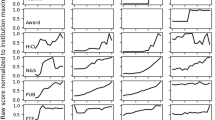Abstract
Both Germany and Korea have recently attempted to improve their positions in worldwide university rankings, introducing major reforms with the aim of funding research clusters and groups. Additionally, Germany has opted to introduce elite universities and junior professorships. The THE-QS World University Rankings, a compilation published from 2004 to 2009, provides some evidence that the mean ranking of German universities did not improve during the observed period. This paper tentatively suggests that this may be due to the fact that Germany is lacking a publish-or-perish promotion system spanning the period from graduation to tenure. In contrast, Korea has implemented a number of “big-push” reforms such as mandatory English curricula, foreign professorships, and foreign-student quotas, all of which have apparently resulted in a massive “brain gain.” In addition, the Korean government’s efforts to make publications in acknowledged journals compulsory have dramatically improved Korea’s research output and apparently contributed to its sharp rise in the THE-QS World University Rankings. Though Korean universities surpassed German ones on average in the short run, the effects of the German academic reforms await further ranking evidence in the long run. Further drawbacks and advantages of the system in Korea and Germany are critically discussed.
Similar content being viewed by others
References
Cho Z-H (1999) Brain (dead) Korea 21? Letter to the editor Korean American Science Technology Newsletter 99-29 (No. 209)
Chronicle of Higher Education (2011a) South Korea brings in foreign professors by the thousands, but is it ready for them? 27 February 2011
Chronicle of Higher Education (2011b) To raise its global profile, a Korean U. shakes up its campus. 5 January 2011
Deutsche Forschungsmeinschaft (2011) Exzellenzinitiative auf einen Blick. Deutsche Forschungsmeinschaft, Bonn
Deutscher Akademischer Austauschdienst & HIS-Institut für Hochschulforschung (2011) Wissenschaft Weltoffen: Daten und Fakten zur Internationalität von Studium und Forschung in Deutschland. Bertelsmann, Bielefeld
Die Zeit (2010). Privatdozenten: Uni-Sklaven, vereinigt euch! 25 March 2010
Elsevier Publisher (2011) Social Science & Medicine Top Rated Journal. Press Release. Under: http://www.elsevier.com/authored_subject_sections/S06/S06_351/misc/SSM_pressrelease.pdf.Accessed 12 Dec 2011
Federkeil G, Buch F (2007) Fuenf Jahre Juniorprofessur. CHE Centrum für Hochschulentwicklung, Guetersloh
Goldsmith J, Komlos J, Gold PS (2001) The Chicago guide to your academic career: a portable mentor for scholars from graduate school through tenure. The University of Chicago Press, Chicago
Gress DR, Ilon L (2009) Successful integration of foreign faculty into Korean universities: A proposed framework. KEDI J Educ Policy 6(2):183–204
Hankyoreh (2011) Audit reveals university tuition bubble and embezzlement 4 November 2011
Jang D-H, Kim L (2013) Framing “world class” differently: international and Korean participants' perceptions of the world class university project. High Educ 65(6):725–744
Kamenz U, Wehrle M (2007) Professor Untat. Econ, Berlin
Kim T (2005) Internationalisation of higher education in South Korea: reality, rhetoric, and disparity in academic culture and identities. Aust J Educ 49(1):89–103
Korea Herald (2010) University tuition surged over 5 years. 30 March 2010
Korea Times (2010) Koreans poor in TOEFL speaking. 2 April 2010
Lie J (1998) Han Unbound: The political economy of South Korea. Stanford University Press, Stanford
Lim T (2009) “Who is Korean? Migration, immigration, and the challenge of multiculturalism in homogeneous societies”. Asia-Pac J 30:1–09
Marginson S (2011) Higher education in East Asia and Singapore: rise of the Confucian Model. High Educ 61(5):587–611
Oh S-J (2007) Academic research in Korea. Nat Mater 6:707–709
Organisation for Economic Co-Operation and Development (2005) OECD Factbook 2005. OECD, Paris
Organisation for Economic Co-Operation and Development (2010) OECD Factbook 2010. OECD, Paris
Pusser B, Marginson S (2013) University rankings in critical perspective. J High Educ 84(4):544–568
Seong S, Popper SW, Goldman CA, Evans DK, Grammich CA (2008) Brain Korea 21 Phase II. Rand, Santa Monica
Shin JC (2012) Higher education development in Korea: western university ideas, Confucian tradition, and economic development. High Educ 64:59–72
Sondermann M, Simon D, Scholz A-M, Hornbostel S (2008) Die Exzellenzinitiative. iFQ-Working Paper 5.
Song B-N (1990) The rise of the Korean economy. Oxford University Press, Oxford
Statistisches Bundesamt (2000) Statistisches Jahrbuch 2000. Statistisches Bundesamt, Wiesbaden
Statistisches Bundesamt (2010) Statistisches Jahrbuch 2010. Statistisches Bundesamt, Wiesbaden
Tonggye Cheong (2000) Hangukae Sahoejipyo. Tonggye Cheong, Daejon
Tonggye Cheong (2004) Hanguk Tonggye Yeongam 2003. Tonggye Cheong, Daejon
Tonggye Cheong (2010) Hanguk Tonggye Yeongam 2010. Tonggye Cheong, Daejon
Weidman JC, Joh SD (2008) Trends in the Internationalization of Higher Education in South Korea. Int Stud Educ 9:3–4
World Bank (2010) World Development Indicators 2010. The World Bank, Washington, DC
Yang R, Welch A (2012) A world-class university in China? The case of Tsinghua. High Educ 63(5):645–666
Zhang D (2013) Tongshi education reform in a Chinese university: knowledge, values, and organizational changes. Comp Educ Rev 56(3):394–420
Acknowledgments
This work was supported by the National Research Foundation of the government of the Republic of Korea (MEST) (NRF-2007-361-AL0014).
Author information
Authors and Affiliations
Corresponding author
Rights and permissions
About this article
Cite this article
Schwekendiek, D. Recent changes in World University Rankings: an explorative study of Korea and Germany. Asia Eur J 13, 361–377 (2015). https://doi.org/10.1007/s10308-015-0411-4
Received:
Revised:
Accepted:
Published:
Issue Date:
DOI: https://doi.org/10.1007/s10308-015-0411-4




